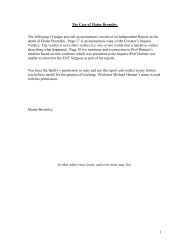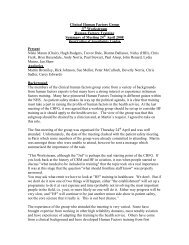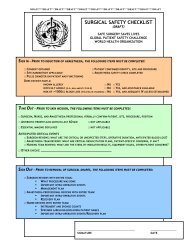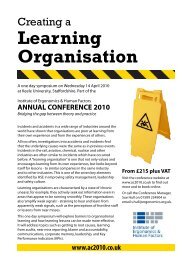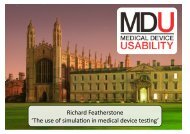The Essentials of Patient Safety - Clinical Human Factors Group
The Essentials of Patient Safety - Clinical Human Factors Group
The Essentials of Patient Safety - Clinical Human Factors Group
Create successful ePaper yourself
Turn your PDF publications into a flip-book with our unique Google optimized e-Paper software.
<strong>The</strong> <strong>Essentials</strong> <strong>of</strong> <strong>Patient</strong> <strong>Safety</strong><br />
least implied and accepted in that environment; second, there must be some kind <strong>of</strong><br />
; third, the person involved did not intend this and<br />
must, at least potentially, have been able to act in a different way. All three <strong>of</strong> these<br />
criteria can be challenged, or at least prove difficult to pin down in practice. Much<br />
clinical medicine for instance is inherently uncertain and there are frequently no<br />
guidelines or protocols to guide treatment. In addition the failure is not necessarily<br />
easy to identify; it is certainly not always clear, at least at the time, when a diagnosis<br />
is wrong or when at what point blood levels <strong>of</strong> a drug become dangerously high.<br />
Finally, the notion <strong>of</strong> intention, and in theory at least being able to act differently, is<br />
<br />
fatigue or peer pressure, which they may not be aware <strong>of</strong> and have little control over.<br />
So, while the working definition is reasonable, we should be aware <strong>of</strong> its limitations<br />
and the difficulties <strong>of</strong> applying it in practice.<br />
Types <strong>of</strong> error<br />
In his analysis <strong>of</strong> different types <strong>of</strong> error James Reason (6)divides them into two<br />
broad types: slips and lapses, which are errors <strong>of</strong> action, and mistakes which are,<br />
broadly speaking, errors <strong>of</strong> knowledge or planning.<br />
Slips and lapses<br />
Slips and lapses occur when a person knows what they want to do, but the action does<br />
not turn out as they intended. Slips relate to observable actions and are associated<br />
with attentional failures (such as picking up the wrong syringe), whereas lapses are<br />
internal events and associated with failures <strong>of</strong> memory (such as forgetting to give the<br />
drug altogether).<br />
Mistakes<br />
Slips and lapses are errors <strong>of</strong> action; you intend to do something, but it does not go<br />
according to plan. With mistakes, the actions may go entirely as planned but the plan<br />
itself deviates from some adequate path towards its intended goal. Here the failure lies<br />
at a higher level: with the mental processes involved in planning, formulating<br />
intentions, judging, and problem solving(6). If a doctor treats someone with chest pain<br />
as if they have a myocardial infarction, when in fact they do not, then this is a<br />
mistake. <strong>The</strong> intention is clear, the action corresponds with the intention, but the plan<br />
was wrong.<br />
In daily life errors are frequently attributed to stupidity, carelessness,<br />
forgetfulness, recklessness and other personal defects. <strong>The</strong> implication is that the<br />
person who makes an error has certain characteristics which produce the error and,<br />
furthermore, that these characteristics are under their control and they are therefore to<br />
blame for the errors they make. This is error seen from the individual perspective;<br />
when applied to understanding accidents Reason refers to this as the person<br />
(7). Efforts to reduce error are, from this perspective, targeted at individuals<br />
and involve exhortations or adding new rules and<br />
procedures. For errors with more serious consequences, more severe sanctions come<br />
into play such as naming and shaming, disciplinary action, suspension, media<br />
condemnation and so on. However, while reckless behaviour may well deserve blame<br />
and sanction, we need to approach error rather more thoughtfully.<br />
19



